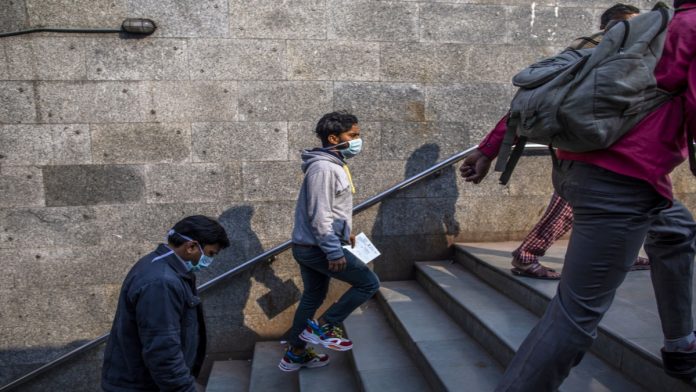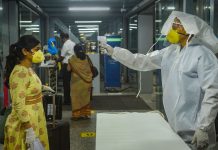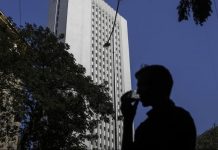
New Delhi: As the coronavirus pandemic induces panic across India, people from the Northeast have become targets for racial discrimination and slurs, with several such incidents coming to light.
The issue rose to prominence Sunday as a picture of a Manipuri woman who had been ‘spat on’ and called “Corona” by a middle-aged man went viral and sparked outrage for its racism.
On the same night, a group of students in Kolkata were allegedly attacked and beaten by their neighbours who demanded they left the premises.
Tongou Mechia, an employee at the Oberoi Grand Hotel in the city, said she got a call from an intern — one of the students attacked — seeking rescue as a small crowd had gathered around her house in Rajendra Prasad Colony. The intern lived with three other women, all of whom are from Nagaland and Manipur.
“I took two male friends with me because I felt it would be unsafe for me to go alone. Crowds had already come when we arrived, and they were banging on their door. The landlord had a problem that two males had come and escorted them out, and that’s when the crowd beat them,” she told ThePrint.
“Some of the local people were even shouting that they would kill and chop the boys into pieces that night itself.”
Mechia, who is Manipuri, said she ultimately had to call the Oberoi security personnel to escort them out of the premises.
“As we left the crowd was shouting ‘Go corona go’. All we want is security from harassment like this which can become life threatening. How can we feel safe in mainland India when our fundamental rights are threatened?” she said.
The alleged attacks came amid a complete lockdown in the country as coronavirus, which emerged from China’s Wuhan region last year, has now claimed 10 lives in India. The number of cases stands at 561.
Also read: This is how Modi govt plans to help MGNREGA workers during Covid-19 lockdown
Racism ‘more pronounced’
ThePrint spoke to several people from across the Northeast who claimed similar experiences since the pandemic broke out.
“When I first moved to Delhi (six) years ago, I was extremely conscious of the way people looked at me and treated me, and I got used to it with time. But since the pandemic broke out, people’s racism has become more pronounced,” said Pamziuliu Gonmei, an assistant professor of English at Delhi University (DU).
“In March alone, there have been two instances where I’ve been called ‘Corona’ to my face. The first was on Holi day when I was taking a picture near India Gate. A boy whispered to his family ‘Chinese hai, corona hai’ and their family started backing away from me. The very next day I was walking around DU when a boy shouted ‘Corona’ and fled,” said Gonmei, who hails from Manipur.
A student from Mizoram and currently studying at Lady Shri Ram College in Delhi claimed she was targeted while buying shoes on 7 February.
“I went to buy shoes in a market in Vasant Kunj when two to three people entered. I was wearing a mask, and when they saw me they coughed and said ‘corona’ between their coughs,” said the student who did not wish to be named.
“I didn’t think it was wise to confront them since I was completely alone and you never know when these things can escalate. I was worried for my safety,” added the student.
Also read: Spreading fake news, rumours on Covid-19 can land you in jail for a year
Women more vulnerable to attack
Alana Golmei, a lawyer and activist who runs the North East Support Centre and Helpline, said that since the pandemic broke out, she has received over thrice the usual number of complaints and cases regarding racism.
“I used to get maybe one or two cases a week before. Now I’m getting four-five calls and messages a day,” Golmei told ThePrint. She started the helpline in 2007 as a way to help people facing discrimination and connect them with volunteers and resources for legal recourse.
“When it comes to racial abuse, both men and women are faced with it but women are more vulnerable, because perpetrators feel they can get away with it without getting into a fight. Of all the calls and complaints I’ve received, about 60 per cent come from women,” she said.
Since 3 March, Delhi’s Special Police Unit for North East Region (SPUNER) has recorded a total of 10 cases of racial discrimination related to the coronavirus, seven of which were filed by women.
Ninggailiu Panmei, a 20-year-old Manipuri student at Lady Shri Ram College, said while she was shopping in Sarojini Nagar market one day, a woman and her daughter covered their mouths while walking past her.
“They had asked me to move and so I made way for them despite it being a heavily crowded market. Then when they walked past me they covered their mouths, and the mother told her small daughter to stay away from me,” she said.
“I was shocked. I understand the panic but I had no idea how to react to this. It was the first time I faced such blatant racism,” said Panmei.
Gonmei said the sudden racist abuse has changed the way she feels and acts in public spaces. “I wear a mask not only for protection but also so that I am not racially profiled. Self isolation has really helped in that sense, because I don’t have to be anxious about stepping out.”
Also read: At current rate, India can see 30,000 COVID-19 deaths by May, no hospital bed by June: Data
‘No proper law’
Hibu Tamang, additional commissioner of SPUNER, said cases are not properly addressed because police officers on ground are not aware of what sections under the Indian Penal Code can be used to file the complaint.
“When racist remarks like this are made, the police don’t know which sections to file complaints under. Normally for women it is filed under 509 (Word, gesture or act intended to insult the modesty of a woman). There is no section of law that specifically addresses racist remarks,” he told ThePrint.
“There is a proposal to include incitement to hatred as section 153C, but that is still under consideration,” said Tamang.
He also said officers, where applicable, could file cases under the SC/ST Atrocities Act but it “does not occur to them to do so”.
“It’s not just Delhi and Kolkata — this problem is occurring everywhere. We have been conducting awareness programmes with RWAs (Resident Welfare Associations) around Delhi University so they have a better cultural understanding of the North East. The only way to address this deep rooted racism is through education.”
Also read: Modi’s Covid-19 lockdown speech shows he doesn’t learn from past mistakes, or doesn’t care to
ThePrint is now on Telegram. For the best reports & opinion on politics, governance and more, subscribe to ThePrint on Telegram. Subscribe to our YouTube channel.






This is precisely why North eastern states are demanding a separate country, for why would you want to be a citizen of a country that racially abuses you, spits at you or even physically beat you when you pay the same taxes as everyone in the other regions of the country. What kind of a government do we even have be it BJP or Congress , huh? This racism has been going on since independence, so please stop this racism for good or we’ll have to become independent from India soon.